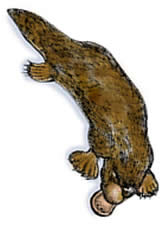
Dimdima
Online Children's Magazine from India

Dimdima
Online Children's Magazine from India




The duck-billed platypus of Australia feeds on live prey, such as shrimps, worms, snails, tadpoles and small fish. When it dives, its eyes close and its eyelids cover its ear holes. Scientists thought that it used both its acute sense of smell and ultra-sensitive bill to catch prey.
In 1986, a German scientist named Henning Scheich found that platypuses could find shrimps hidden in hollow bricks. Shrimps show an increase in the weak electrical charge all animals emit, when they flick their tails. To test if the platypuses were able to detect this, he let them choose between a charged torch battery, a dead battery and a shrimp.
The animals ignored the dead battery but attacked the charged battery more times than the shrimp!
The secret was in the sensors platypuses have in their bills. These are connected to a point in the brain that is specially sensitive to electrical stimulation. That enabled them to detect the tiny electrical charge given off by their prey.
Last updated on :3/28/2006
EXPLORE MORE...
COMMENT ON THIS ARTICLE
Wants to share something related to this article? Please use the form below.
Dimdima is the Sanskrit word for ‘drumbeat’. In olden days, victory in battle was heralded by the beat of drums or any important news to be conveyed to the people used to be accompanied with drumbeats.
Bharatiya Vidya Bhavan
K. M Munshi Marg,
Chowpatty, Mumbai - 400 007
email : editor@dimdima.com
Bharatiya Vidya Bhavan
505, Sane Guruji Marg,
Tardeo, Mumbai - 400 034
email : promo@dimdima.com
Dimdima.com, the Children's Website of Bharatiya Vidya Bhavan launched in 2000 and came out with a Printed version of Dimdima Magazine in 2004. At present the Printed Version have more than 35,000 subscribers from India and Abroad.